LEGAL
Page 5
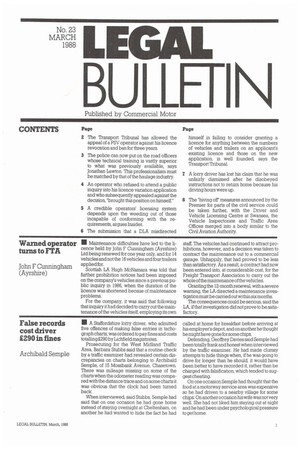
Page 6
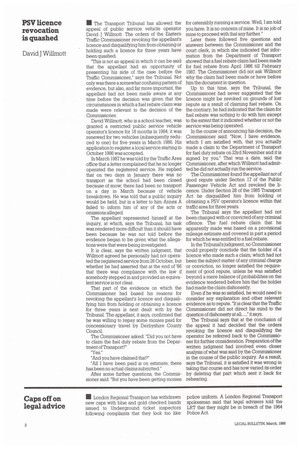
Page 7
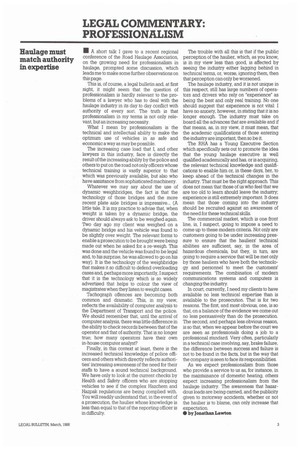
Page 8
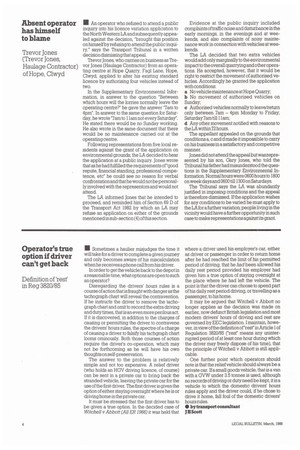
Page 9
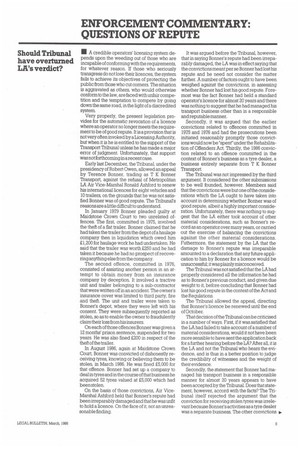
Page 10
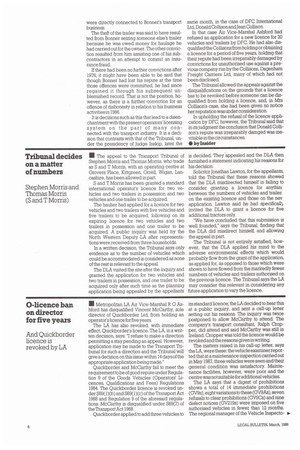
Page 11
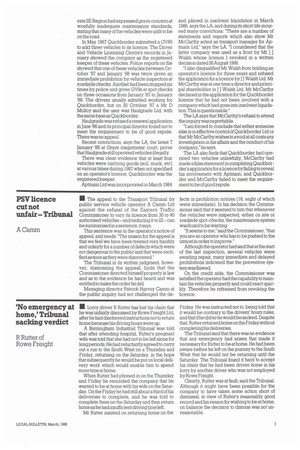
Page 12
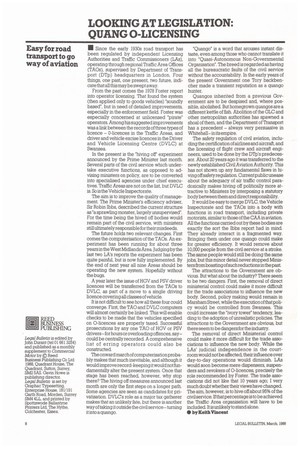
If you've noticed an error in this article please click here to report it so we can fix it.
BULLEFIN
2 The Transport Tribunal has allowed the appeal of a PSV operator against his licence revocation and ban for three years.
3 The police can now put on the road officers whose technical training is vastly superior to what was previously available, says Jonathan Lawton. This professionalism must be matched by that of the haulage industry.
4 An operator who refused to attend a public inquiry into his licence variation application and who subsequently appealed against the decision, 'brought this position on himself."
5 A credible operators' licensing system depends upon the weeding out of those incapable of conforming with the requirements, argues Insider.
6 The submission that a DLA misdirected • Maintenance difficulties have led to the licence held by John F Cunningham (Ayrshire) Ltd being renewed for one year only, and for 14 vehicles and not the 16 vehicles and four trailers applied for.
Scottish LA Hugh McNamara was told that further prohibition notices had been imposed on the company's vehicles since a previous public inquiry in 1986, when the duration of the licence was shortened becaue of maintenance problems.
For the company, it was said that following that inquiry it had decided to carry out the maintenance of the vehicles itself, employing its own II A Staffordshire lorry driver, who admitted five offences of making false entries in tachograph charts, was ordered to pay fmes and costs totalling £290 by Lichfield magistrates.
Prosecuting for the West Midland Traffic Area, Barbara Stubbs said that a routine check by a traffic examiner had revealed certain discrepancies on charts belonging to Archibald Semple, of 15 Mossbank Avenue, Chasetown. There was mileage missing on some of the charts when the odometer reading was compared with the distance trace and on some charts it was obvious that the clock had been turned back.
When interviewed, said Stubbs, Semple had said that on one occasion he had gone home instead of staying overnight at Cheltenham, on another he had wanted to hide the fact he had himself in failing to consider granting a licence for anything between the numbers of vehicles and trailers on an applicant's existing licence and those on the new application, is well founded, says the Transport Tribunal.
7 A lorry driver has lost his claim that he was unfairly dismissed after he disobeyed instructions not to return home because his driving hours were up.
8 The 'hiving off' measures announced by the Premier for parts of the civil service could be taken further, with the Driver and Vehicle Licensing Centre at Swansea, the Vehicle Inspectorate and Traffic Area Offices merged into a body similar to the Civil Aviation Authority.
staff. The vehicles had continued to attract prohibitions, however, and a decision was taken to contract the maintenance out to a commercial garage. Unhappily, that had proved to be less than satisfactory. As a result, a contract had now been entered into, at considerable cost, for the Freight Transport Association to carry out the whole of the maintenance of the vehicles.
Granting the 12-monthrenewal, witha severe warning, the LA directed a maintenance investigation must be carried out within six months.
The consequences could be serious, said the LA, if that investigation did not prove to be satisfactory.
called at home for breakfast before arriving at his employer's depot, and on another he thought he might have gone for some chips.
Defending, Geoffrey Davies said Semple had been totally frank and honest when interviewed by the traffic examiner. He had made clumsy attempts to hide things when, if he was going to drive for longer than he should, it would have been better to have recorded it, rather than be charged with falsification, which tended to suggest cheating.
On one occasion Semple had thought that the food at a motorway service area was expensive so he had driven to a nearby village for some chips. On another occasion his wife was not very well. She had not liked him staying out at night and he had been under psychological pressure to get home. • The Transport Tribunal has allowed the appeal of public service vehicle operator David J Willmott. The orders of the Eastern Traffic Commissioner revoking the appellant's licence and disqualifying him from obtaining or holding such a licence for three years have been quashed.
"This is not an appeal in which it can be said that the appellant had an opportunity of presenting his side of the case before the Traffic Commissioner," says the Tribunal. Not only was there a somewhat confusing pattern of evidence, but also, and far more important, the appellant had not been made aware at any time before the decision was given that the circumstances in which a fuel rebate claim was made were relevant to the decision of the Commissioner.
David Willmott, who is a school teacher, was granted a restricted public service vehicle operator's licence for 18 months in 1984; it was renewed for two vehicles (subsequently reduced to one) for five years in March 1986, His application to register a local service starting in October 1986 was accepted.
In March 1987 he was told by the Traffic Area office that a letter complained that he no longer operated the registered service. He replied that on two days in January there was no transport as the school had been closed because of snow; there had been no transport on a day in March because of vehicle breakdown. He was told that a public inquiry would be held, but in a letter to him Annex A failed to inform him of any of the acts or omissions alleged.
The appellant represented himself at the inquiry, at which, says the Tribunal, his task was rendered more difficult than it should have been because he was not told before the evidence began to be given what the allegations were that were being investigated.
It is clear, says the written judgment, that Willmott agreed he personally had not operated the registered service from 26 October, but whether he had asserted that at the end of '86 that there was compliance with the law if somebody stepped in and provided an equivalent service is not clear.
That part of the evidence on which the Commissioner had based his reasons for revoking the appellant's licence and disqualifying him from holding or obtaining a licence for three years is next dealt with by the Tribunal. The appellant, it says, confirmed that he was willing to repay some monies paid for concessionary travel by Derbyshire County Council.
The Commissioner asked: "Did you not have to claim the fuel duty rebate from the Department of Transport?"
"Yes."
"And you have claimed that?"
"All 1 have been paid is on estimate; there has been no actual claims submitted."
After some further questions, the Commissioner said: But you have been getting monies for ostensibly running a service. Well, I am told you have. It is no concern of mine. It is no job of mine to proceed with that any further."
Later there followed five questions and answers between the Commissioner and the court clerk, in which she indicated that infor mation from the Department of Transport showed that a fuel rebate claim had been made for fuel rebate from April 1986 till February 1987. The Commissioner did not ask Willmott why the claim had been made or have before him the document in question.
Up to this time, says the Tribunal, the Commissioner had never suggested that the licence might be revoked on grounds of lost repute as a result of claiming fuel rebate. On the contrary, he had indicated that the claim for fuel rebate was nothing to do with him except to the extent that it indicated whether or not the service was being operated.
In the course of announcing his decision, the Commissioner said: "Now, I have evidence, which I am satisfied with, that you actually made a claim to the Department of Transport for fuel duty rebate on 23rd November and it is signed by you." That was a date, said the Commissioner, after which Willmott had admitted he did not actually run the service.
The Commissioner found the appellant not of good repute under Section 17 of the Public Passenger Vehicle Act and revoked the licence. Under Section 28 of the 1985 Transport Act he disqualified him from holding or obtaining a PSV operator's licence within that traffic area for three years.
The Tribunal says the appellant had not been charged with or convicted of any criminal offence. The fuel rebate claim that he apparently made was based on a provisional mileage estimate and covered in part a period for which he was entitled to a fuel rebate.
In the Tribunal's judgment, no Commissioner could properly conclude that the holder of a licence who made such a claim, which had not been the subject matter of any criminal charge or conviction, no longer satisfied the requirement of good repute, unless he was satisfied beyond a mere balance of probabilities on the evidence tendered before him that the holder had made the claim dishonestly.
Even if he was so satisfied, he would need to consider any explanation and other relevant evidence as to repute. "It is clear that the Traffic Commissioner did not direct his mind to the question of dishonesty at all "it says.
The Tribunal says that at the conclusion of the appeal it had decided that the orders revoking the licence and disqualifying the operator be referred back to the Commissioner for further consideration. Preparation of the written judgment had involved even closer analysis of what was said by the Commissioner in the course of the public inquiry. As a result, says the Tribunal, it is satisfied it was wrong in taking that course and has now varied its order by deleting that part which sent it back for rehearing. • A short talk I gave to a recent regional conference of the Road Haulage Association, on the growing need for professionalism in haulage, prompted some discussion, which leads me to make some further observations on this page.
This is, of course, a legal bulletin and, at first sight, it might seem that the question of professionalism is hardly relevant to the problems of a lawyer who has to deal with the haulage industry in its day to day conflict with authority of every sort The truth is that professionalism in my terms is not only relevant, but an increasing necessity.
What I mean by professionalism is the technical and intellectual ability to make the optimum use of vehicles in as safe and economic a way as may be possible.
The increasing case load that I, and other lawyers in this industry, face is directly the result of the increasing ability by the police and others to put on the road not only officers whose technical training is vastly superior to that which was previously available, but also who have assistance from sophisticated machinery.
Whatever we may say about the use of dynamic weighbridges, the fact is that the technology of those bridges and the more recent plate axle bridges is impressive... (A little tale. It is my practice to advise that, when weight is taken by a dynamic bridge, the driver should always ask to be weighed again. Two day ago my client was weighed on a dynamic bridge and his vehicle was found to be slightly over weight. The relevant forms to enable a prosecution to be brought were being made out when he asked for a re-weigh. This was done and the vehicle was found to be legal and, to his surprise, he was allowed to go on his way). It is the technology of the weighbridge that makes it so difficult to defend overloading cases and, perhaps more importantly, I suspect that it is the technology which is so widely advertised that helps to colour the view of magistrates when they listen to weight cases.
Tachograph offences are becoming both common and dramatic. This, in my view, reflects the availability of computer analysis to the Department of Transport and the police. We should remember that, until the arrival of computer analysis, there was little difference in the ability to check records between that of the operator and that of authority. That is no longer true; how many operators have their own in-house computer analyst?
Finally, in this context at least, there is the increased technical knowledge of police officers and others which directly reflects authorities' increasing awareness of the need for their staffs to have a sound technical background. We have only to look at the current checks by Health and Safety officers who are stopping vehicles to see if the complex Hazchem and Hazpak regulations are being complied with. You will readily understand that, in the event of a prosecution, the haulier whose knowledge is less than equal to that of the reporting officer is in difficulty. The trouble with all this is that if the public perception of the haulier, which, as you know, is in my view less than good, is affected by seeing the industry either lagging behind in technical terms, or, worse, ignoring them, then that perception can only be worsened.
The haulage industry, and it is not unique in this respect, still has large numbers of operators and drivers who rely on "experience" as being the best and only real training. No one should suggest that experience is not vital: I have no anxiety, however, in stating that it is no longer enough. The industry must take on board all the advances that are available and if that means, as, in my view, it must mean, that the academic qualifications of those entering the industry are important, then so be it.
The RHA has a Young Executive Section which specifically sets out to promote the idea that the young haulage executive 3s well qualified academically and has, or is acquiring, the relevant technical knowledge and qualifications to enable him or, in these days, her, to keep ahead of the technical changes in the industry. That must be the right approach. This does not mean that those of us who feel that we are too old to learn should leave the industry; experience is still extremely important. It does mean that those corning into the industry should be recruited against an awareness of the need for these technical skills.
The commercial market, which is one front line, is, I suspect, going to impose a need to come up to these modern criteria. Not only are customers going to be under increasing pressure to ensure that the hauliers technical abilities are sufficient, say, in the area of hazardous chemicals, but they, in turn, are going to require a service that will be met only by those hauliers who have both the technology and personnel to meet the customers' requirements. The combination of modern communications systems and computers is changing the industry.
In court, currently, I need my clients to have available no less technical expertise than is available to the prosecution. That is for two reasons. The first, and most obvious, one, is so that, on a balance of the evidence we come out no less persuasively than do the prosecution. The second, and perhaps less obvious reason, is so that, when we appear before the court we are seen as professionals doing a job to a professional standard. Very often, particularly in a technical case involving, say, brake failure, the difference between success and failure is not to be found in the facts, but in the way that the company is seen to face its responsibilities.
As we expect professionalism from those who provide a service to us as, for instance, in the maintamance of domestic heating, others expect increasing professionalism from the haulage industry. The awareness that hazardous loads are being carried, and the publicity given to motorway accidents, whether or not the haulier is to blame, can only increase that expectation.
• by Jonathan Lawton • An operator who refused to attend a public inquiry into his licence variation application to the North Western LA and subsequently appealed against the decision, "brought this position on himself by refusing to attend the public inquiry," says the Transport Tribunal in a written decision dismissing that appeal Trevor Jones, who carries on business as Trevor Jones (Haulage Contractor) from an operating centre at Hope Quarry, Fagl Lane, Hope, Clwyd, applied to alter his existing standard licence by authorising four vehicles instead of two.
In the Supplementary Environmental Information, in answer to the question "Between which hours will the lorries normally leave the operating centre?" he gave the answer "7am to 4prn". In answer to the same question for Saturday, he wrote "7am to 1 1 am not every Saturday. He stated there would be no Sunday working. He also wrote in the same document that there would be no maintenance carried out at the operating centre.
Following representations from five local residents against the grant of the application on environmental grounds, the LA decided to hear the application at a public inquiry. Jones wrote that as he had fulfilled the requirements of "good repute, financial standing, professional competence, etc" he could see no reason for verbal confrontation and that he would not be personally involved with the representors and would not attend.
The LA informed Jones that he intended to proceed, and reminded him of Section 69 D of the Transport Act 1982 by which an LA may refuse an application on either of the grounds mentioned in sub-section (4) of this section Evidence at the public inquiry included complaints of traffie noise and disturbance in the early mornings, in the evenings and at weekends, and also complaints of noisy maintenance work in connection with vehicles at weekends.
The LA decided that two extra vehicles would add only marginally to the environmental impact to the overall quarrying and other operations. He accepted, however, that it would be right to restrict the movement of authorised vehicles. Accordingly he granted the application with conditions: a No vehicle maintenance at Hope Quarry; b No movement of authorised vehicles on Sunday; c Authorised vehicles normally to leave/return only between 7am 4pm Monday to Friday; Saturday TamtilIllam; d Any other movement notified with reasons to the LA within 72 hours.
The appellant appealed on the grounds that conditions a, c and d made it impossible to carry on his business in a satisfactory and competitive manner.
Jones did not attend the appeal but wasrepresented by his son, Gary Jones, who told the Tribunal his father had misunderstood the questions in the Supplementary Environmental Information. Normal hours were 0600 hours to 1800 on weekdays and 0600 till 1300 on Saturdays.
The Tribunal says the LA was abundantly justified in imposing conditions and the appeal is therefore dismissed. lithe application wishes for any conditions to be varied he must apply to the LA for a further variation; people living in the vicinity would have a further opportunity in such case to make representations against its grant.
• Sometimes a haulier misjudges the time it will take fora driver to complete a given journey and only becomes aware of his miscalculation when he receives a phone call from his driver.
In order to get the vehicle back to the depot in a reasonable time, what options are open to such an operator?
Disregarding the drivers' hours rules is a course of action that is fraught with danger as the tachograph chart will reveal the contravention. If he instructs the driver to remove the tachograph chart and omit to record the extra driving and duty times, that is an even more perilous act. If it is discovered, in addition to the charges of causing or permitting the driver to contravene the drivers' hours rules, the spectre of a charge of causing a driver to falsify his tachgraph chart looms ominously. Both those courses of action require the driver's co-operation, which may not be forthcoming as he will have his own thoughts on self-preservation.
The answer to the problem is relatively simple and not too expensive. A relief driver (who holds an HGV driving licence, of course) can be sent in a private car to bring back the stranded vehicle, leaving the private car for the use of the first driver. The first driver is given the option of either staying overnight where he is or driving home in the private car.
It must be stressed that the first driver has to be given a true option. In the decided case of Witchell v Abbott (Al) ER 1966) it was held that where a driver used his employer's car, either as driver or passenger in order to return home after he had reached the limit of his permitted period of driving, that he had been allowed his daily rest period provided his employer had given him a true option of staying overnight at the place where he had left the vehicle. The point is that the driver can choose to spend part of his daily rest period driving, or travelling as a passenger, to his home.
It may be argued that Witchell v Abbott no longer applies as the decision was made on earlier, now defunct British legislation and most modern drivers' hours of driving and rest are governed by EEC legislation. I maintain, however, in viewof the definition of "rest" in Article 1 of Regulation 3820/85 ("rest" means any uninterrupted period of at least one hour during which the driver may freely dispose of his time), that the principle of Witchell v Abbott is still applicable.
One further point which operators should note is that the relief vehicle should always be a private car. Ha small goods vehicle, that is a van with a GVW under 3.5 tonnes is used, although no records of driving or duty need be kept, it is a vehicle to which the domestic drivers' hours rules apply and the driver could, if he chose to drive it home, fall foul of the domestic drivers' hours rules.
• by transport consultant JHScott 111 A credible operators licensing system depends upon the weeding out of those who are incapable of conforming with the requirements, for whatever reason. If those who seriously transgress do not lose their licences, the system fails to achieve its objectives of protecting the public from those who cut corners. The situation is aggravated as others, who would otherwise conform to the law, are faced with unfair competition and the temptation to compete by going down the same road, in the light of a discredited system.
Very properly, the present legislation provides for the automatic revocation of a licence where an operator no longer meets the requirement to be of good repute. It is a provision that is not very often invoked by a Licensing Authority, but when it is he is entitled to the support of the Transport Tribunal unless he has made a major error of judgment. Unfortunately, that support was not forthcoming in a recent case.
Early last December, the Tribunal, under the presidency of Robert Owen, allowed an appeal by Terence Bonner, trading as T K Bonner Transport, against the refusal of Metropolitan LA Air Vice-Marshal Ronald Ashford to renew his international licences for eight vehicles and 10 trailers, on the grounds that he was not satisfied Bonner was of good repute. The Tribunal's reasonsare a little difficult to understand.
In January 1979 Bonner pleaded guilty at Maidstone Crown Court to two unrelated offences. The first, committed in 1975, involved the theft of a flat trailer. Bonner claimed that he had taken the trailer from the depot of a haulage company then in liquidation which owed him £1,200 for haulage work he had undertaken. He said that the trailer was worth £250 and he had taken it because he had no prospect of recovering anything else from the company.
The second offence, committed in 1976, consisted of assisting another person in an attempt to obtain money from an insurance company by deception. It involved a tractive unit and trailer belonging to a sub-contractor that were written off in an accident. The owner's insurance cover was limited to third party, fire and theft. The unit and trailer were taken to Banner's depot, where they were left with his consent. They were subsequently reported as stolen, so as to enable the owner to fraudulently claim their loss from his insurers.
On each of those offences Bonner was given a 12 months' prison sentence, suspended for two years He was also fined £200 in respect of the theft of the trailer.
In August 1986, again at Maidstone Crown Court, Bonner was convicted of dishonestly receiving tyres, knowing or believing them to be stolen, in March 1986. He was fined £5,000 for that offence. Bonner had set up a company to deal in tyres and in the course of that business he acquired 52 tyres valued at £5,000 which had been stolen.
On the basis of those convictions, Air ViceMarshal Ashford held that Banner's repute had been irreparably damaged and that he was unfit to hold a licence. On the face of it, not an unreasonable finding. It was argued before the Tribunal, however, that in saying Banner's repute had been irreparably damaged, the LA was in effect saying that the convictions meant per se Bonner had lost his repute and he need not consider the matter further. A number of factors ought to have been weighed against the convictions, in assessing whether Bonner had lost his good repute. Foremost was the fact Bonner had held a standard operator's licence for almost 20 years and there was nothing to suggest that he had managed his transport business other than in a responsible and reputable manner.
Secondly, it was argued that the earlier convictions related to offences committed in 1975 and 1976 and had the prosecutions been initiated reasonably promptly those convictions would now be 'spent" under the Rehabilitation of Offenders Act. Thirdly, the 1986 conviction related to an offence committed in the context of Banner's business as a tyre dealer, a business entirely separate from T K Bonner Transport The Tribunal was not impressed by the third argument. It considered the other submissions to be well founded, however. Members said that the convictions were but one of the considerations which the LA ought to have taken into account in determining whether Bonner was of good repute, albeit a highly important consideration. Unfortunately, there was nothing to suggest that the LA either took account of other material considerations, such as Banner's record as an operator over many years, or carried out the exercise of balancing the convictions against the other material considerations. Futhermore, the statement by the LA that the damage to Banner's repute was irreparable amounted to a declaration that any future application to him by Bonner for a licence would be unsuccessful; it was plainly misconceived.
The Tribunal was not satisfied that the LA had properly considered all the information he had as to Banner's previous conduct, and given due weight to it, before concluding that Bonner had lost his good repute in the context of the Act and the Regulations.
The Tribunal allowed the appeal, directing that Banners licence be renewed until the end of October.
That decision of the Tribunal can be criticised in a number of ways. First, if it was satisfied that the LA had failed to take account of a number of material considerations, would it not have been more sensible to have sent the application back for a further hearing before the LA? After all, it is the LA and not the Tribunal who hears the evidence, and is thus in a better position to judge the credibility of witnesses and the weight of their evidence.
Secondly, the statement that Bonner had managed his transport business in a responsible manner for almost 20 years appears to have been accepted by the Tribunal. Does that statement, however, accord with the facts? The Tribunal itself rejected the argument that the conviction for receiving stolen tyres was irrelevant because Bonner's activities as a tyre dealer was a separate business. The other convictions were directly connected to Bonner's transport business.
The theft of the trailer was said to have resulted from Bonner seizing someone else's trailer because he was owed money for haulage he had carried out for the owner, The other conviction resulted from him assisting one of his subcontractors in an attempt to commit an insurance fraud.
If there had been no further convictions after 1976, it might have been able to be said that though Bonner had lost his repute at the time those offences were committed, he had since regained it through his subsequent unblemished record. That is not the position, however, as there is a further conviction for an offence of dishonesty in relation to his business activities in 1986.
It is decisions such as this that lead to a disenchantment with the present operators' licensing system on the part of many connected with the transport industry. It is a decision that contrasts with that of the Tribunal, under the presidency of Judge Inskip, later the • The appeal to the Transport Tribunal of Stephen Morris and Thomas Moms, who trade as S and T Morris, with an operating centre at Grovers Place, Kittgreen, Onell, Wigan, Lancashire, has been allowed in part.
S and T Morris has been granted a standard international operator's licence for two vehicles and two trailers in possession and two vehicles and one trailer to be acquired.
The haulier had applied for a licence for two vehicles and two trailers with five vehicles and five trailers to be acquired, following on its expiring licence for two vehicles and two trailers in possession and one trailer to be acquired. A public inquiry was held by the North Western Deputy LA after representations were received from three households.
In a written decision, the Tribunal says only evidence as to the number of vehicles which could be accommodated is considered as none of the rest is relevant to the appeal.
The DLA visited the site after the inquiry and granted the application for two vehicles and two trailers in possession, and one trailer to be acquired only after such time as the planning application being appealed by the appellants • Metropolitan LA Air Vice-Marshal R G Ashford has disqualified Vincent McCarthy, sole director of Quickborder Ltd, from holding an operator's licence for five years.
The LA has also revoked, with immediate effect, Quickborder's licence. The LA, in a written decision, says: "I refuse to make a direction permitting a stay pending an appeal. However, application may be made to the Transport Tribunal for such a direction and the Tribunal will give a decision on this issue within 14 days of the appropriate application being made."
Quickborder and McCarthy fail to meet the requirement to be of good repute under Regulation 9 of the Goods Vehicles (Operators' Licences, Qualifications and Fees) Regulations 1984. The Quickborder licence is revoked under S69(1)(b) and S69(1)(c) of the Transport Act 1968 and Regulation 9 of the aforesaid regulations. McCarthy is disqualified under S69(7) of the Transport Act 1968, Quickborder applied to add three vehicles to same month, in the case of DFC International Ltd, Donald Collison and Jean Collison.
In that case Air Vice-Marshal Ashford had refused an application for a new licence for 20 vehicles and trailers by DFC. He had also disqualified the Collisons from holding or obtaining a licence for a period of five years, holding that their repute had been irreparably damaged by convictions for unauthorised use against a previous company run by the Collisons, Dagenham Freight Carriers Ltd, many of which had not been disclosed.
The Tribunal allowed the appeals against the disqualifications on the grounds that a licence has to be revoked before someone can be disqualified from holding a licence, and, in Mrs Collison's case, she had been given no notice her reputation was under consideration.
In upholding the refusal of the licence application by DFC, however, the Tribunal said that in its judgment the conclusion that Donald Collison's repute was irreparably darnged was inevitable in the circumstances, is decided. They appealed and the DLA then furnished a statement indicating his reasons for his decision.
Solicitor Jonathan Lawton, for the appellants, told the Tribunal that these reasons showed that the DLA misdirected himself in failing to consider granting a licence for anythip between the numbers of vehicles and trailer on the existing licence and those on the nev application. Lawton said he had specificath, invited the DLA to grant a licence for five additional tractors only.
We have concluded that this submission is well founded," says the Tribunal, finding that the DLA did misdirect himself, and allowing the appeal in part.
The Tribunal is not entirely satisfied, however, that the DLA applied his mind to the adverse environmental effects which would probably flow from the grant of the application, as applied for, as opposed to those which were shown to have flowed from the markedly fewer numbers of vehicles and trailers authorised on the previous licence. The Tribunal says the LA may consider this relevant in considering any future application to vary the licence.
its standard licence; the LA decided to hear this at a public inquiry, and sent a call-up letter setting out his reasons. The inquiry was twice postponed to allow McCarthy to attend. The company's transport consultant, Ralph Cropper, did attend and said McCarthy was still in Ireland. Cropper was told the licence would be revo ked and the reasons given in writing.
The matters raised in his call-up letter, says the LA, were these: the vehicle examiner reported that at a maintenance inspection carried out in May 1987, three vehicles were seen and their general condition was satisfactory. Maintenance facilities, however, were poor and the centre was not suitable for additional vehicles.
The LA says that a digest of prohibitions shows a total of 14 immediate prohibitions (GV9s), eight variations to these (CV9As), seven refusals to clear prohibitions (GV9Cs) and nine defect notices (GV219s) were imposed on five authorised vehicles in fewer than 12 months. The regional manager of the Vehicle Inspecto rate SE Region had expressed grave concern at woefully inadequate maintenance standards, stating that many of the vehicles were unfit to be on the road.
In May 1987 Quickborder submitted a GV80 to add three vehicles to its licence, The Driver and Vehicle Licensing Centre's records in January showed the company as the registered keeper of these vehicles. Police reports on file showed that one of these vehicles between October '87 and January '88 was twice given an immediate prohibition by vehicle inspectors at roadside checks. Another had been stopped six times by police and given GV9s at spot checks on three occasions from January '87 to January '88. The drivers usually admitted working for Quickborder, but on 30 October '87 a Mr D Molloy said the user was Haulgrade Ltd, with the same base as Quickborder.
Haulgrade wasrefuseda renewal application in June 86 and its principal director found not to meet the requirement to be of good repute. There was no appeal.
Recent convictions, says the LA, the latest 7 January '88 at Grays magistrates court, prove that Haulgrade still operated vehicles illegally_ There was clear evidence that at least four vehicles were carrying goods (soil, muck, etc) at various times during 1987 when not specified on an operator's licence: Quickborder was the registeredkeeper.
Aptmain Ltd was incorporated in March 1984 • The appeal to the Transport Tribunal by public service vehicle operator A Camm Ltd against the refusal of the Eastern Traffic Commissioner to vary its licence from 30 to 40 authorised vehiclesand reducing it to 22 can be summarised in a sentence, it says.
This sentence was in the operator's notice of appeal, and reads: "The reason for the appeal is that we feel we have been treated very harshly and unfairly for a number of defects which were not dangerous to the public and that were rectifiedassoon as they were discovered."
The Tribunal in its written judgment, however, dismissing the appeal, finds that the Commissioner directed himself properly in law and as to the evidence he had heard and was entitled to make the order he did.
Managing director Patrick Harvey Camm at the public inquiry had not challenged the de • Lorry driver R Rutter has lost his claim that he was unfairly dismissed by Rowe Freight Ltd, after he had disobeyed instructions not to return home because his driving hours were up.
A Birmingham Industrial Tribunal was told that after attending hospital, Rutter's pregnant wife was told that she had not to be left alone for long periods. He had reluctantly agreed to carry out a run to the South West on a Thursday and Friday, returning on the Saturday, in the hope that subsequently he would be put on local delivery work which would enable him to spend more time at home.
When Rutter had phoned in on the Thursday and Friday he reminded the company that he wanted to be at home with his wife on the Saturday. On the Friday he had still about a third of his deliveries to complete, and he was told to complete them on the Saturday and then return home as he had insufficient driving time left.
Mr Rutter insisted on returning home on the and placed in insolvent liquidation in March 1986, says the LA, and during its short life incurred many convictions. "There are a number of statements and reports which also show Mr McCarthy acted as transport manager for Aptmain Ltd," says the LA. "I considered that the latter company was used as a front by Mr J J Walsh whose licence I revoked in a written decision dated 26 August 1986.
"I also disqualified Mr Walsh from holding an operator's licence for three years and refused the application for a licence by J J Walsh Ltd. Mr McCarthy was at one time a director and principal shareholder in J J Walsh Ltd. Mr McCarthy declared in the application for the Quickborder licence that he had not been involved with a company which had gone into insolvent liquidation. This is questionable.'
The LA says that McCarthy's refusal to attend the inquiry was regrettable.
"I am forced to conclude that either someone else is in effective control of Quickborder Ltd or that Mr McCarthy wishes to avoid at all costs any investigation in his affairs and the conduct of his company," he says.
The LA also finds that Quickborder had operated two vehicles unlawfully; McCarthy had made a false statement in completing Quicicborder's application for a licence by failing to reveal his involvement with Aptrnain; and Quickborder and McCarthy failed to meet the requirement to be of good repute.
fects in prohibition notices (18, eight of which were immediate). In his decision the Commissioner said that it seemed to him that whenever the vehicles were inspected, either on site or roadside spot-checks, the maintenance system was found to be wanting.
"It seems to me," said the Commissioner, that you are an operator who has to be pushed to the utmost in order to improve."
Although the operator had said that at the start of the last inspection, several vehicles were awaiting repair, many immediate and delayed prohibitions indicated that the preventive system was flawed.
On the credit side, the Commissioner was satisfied the operator had the capability to maintain his vehicles properly and could react quickly. Therefore he refrained from revoking the licence.
Friday. He was instructed not to, being told that it would be contrary to the drivers' hours rules, and that if he did so he would be sacked. Despite that, Rutter returned home on the Friday without completing his deliveries.
The Tribunal said that there was no evidence that any emergency had arisen that made it necessary for Rutter to be home. He had been aware before he left on the journey to the South West that he would not be returning until the Saturday_ The Tribunal found it hard to accept his claim that he had been driven home in his lorry by another driver who was not employed by Rowe Freight.
Clearly, Rutter was at fault, said the Tribunal. Although it might have been possible for the company to have taken some action short of dismissal, in view of Rutter's reasonably good record and his reason for wishing to be at home, on balance the decision to dismiss was not unreasonable. 111 Since the early 1930s road transport has been regulated by independent Licensing Authorities and Traffic Commissioners (LAB), operating through regional Traffic Area Offices (TA0s), supervised by Department of Transport (DTp) headquarters in London. Four things, one past, one present, two future, indicate that all this may be swept away.
From the past comes the 1978 Foster report into operator licensing. That found the system (then applied only to goods vehicles) 'soundly based", but in need of detailed improvements, especially in the enforcement field. Foster was especially concerned at unlicensed "pirate" operators. Among his suggested improvements was a link between the records of three types of licence 0-licences in the Traffic Areas, and driver and vehicle excise licences in the Driver and Vehicle Licensing Centre (DVLC) at Swansea.
In the present is the "hiving off' experiment announced by the Prime Minister last month. Several parts of the civil service which undertake executive functions, as opposed to advising ministers on policy, are to be converted into specialised agencies under chief executives. Traffic Areas are not on the list, but DVLC is. So is the Vehicle Inspectorate.
The aim is to improve the quality of management. The Prime Minister's efficiency adviser, Sir Robin lbbs, described the current structure as "a sprawling monster, largely unsupervised". For the time being the hived off bodies would remain part of the civil service, with ministers still ultimately responsible for their misdeeds.
The future holds two relevant changes. First comes the computerisation of the TA0s. An experiment has been running for about three years in the West Midlands Area. Judging by the last two LA's reports the experiment has been quite painful, but is now fully implemented. By the end of next year all nine Areas should be operating the new system. Hopefully without the bugs.
A year later the issue of HGV and PSV driver licences will be transferred from the TAOs to DVLC, as part of a move to a single driving licence covering all classes of vehicle.
It is not difficult to see how all these four could converge. First, the TAO and DVLC computers will almost certainly be linked. This will enable checks to be made that the vehicles specified on 0-licences are properly taxed. Successful prosecutions by any one TAO of HGV or PSV driversfor hours or overloading offences, saycould be centrally recorded A comprehensive list of erring operators could also be constructed The onward march of computerisation probably makes that much inevitable, and although it would improve record-keeping it would not fundamentally alter the present system. Once that stage has been reached, however, why stop there? The hiving off measures announced last month are only the first steps on a longer path. Some agencies are seen as candidates for privatisation. DVLC's role as a major tax gatherer makes that an unlikely fate, but there is another way of taking it outside the civil service-turning it into a quango. "Quango" is a word that arouses instant distaste, even among those who cannot translate it into "Quasi-Autonomous Non-Governmental Organisation". The breed is regarded as having all the bureaucratic faults of the civil service without the accountability. In the early years of the present Government one Tory backbencher made a transient reputation as a quango hunter.
Quangos inherited from a previous Government are to be despised and, where possible, abolished. But homegrown quangos are a different kettle of fish. Abolition of the GLC and other metropolitan authorities has spawned a shoal of them, and the Department of Transport has a precedent always very persuasive in Whitehallin its empire.
The safety regulation of civil aviation, including the certification of airlines and aircraft, and the licensing of flight crew and aircraft engineers, used to be done by the DTp's predecessor. About 20 years ago it was transferred to the newly established Civil Aviation Authority. This has not shown up any fundamental flaws in hiving off safety regulation. Current public unease about the adequacy of air traffic control paradoxically makes hiving off politically more attractive to Ministers by interposing a statutory body between them and direct responsibility.
It would be easy to merge DVLC, the Vehicle Inspectorate and the TAOs into a body with functions in road transport, including private motorists, similar to those of the CAA in aviation. All the functions carried out by these bodies are exactly the sort the Ibbs report had in mind. They already interact in a fragmented way. Bringing them under one quango could make for greater efficiency. It would remove about 10,000 people from the civil service at a stroke. The same people would still be doing the same jobs, but this minor detail never stopped Ministers from boasting of such reductions in the past The attractions to the Government are obvious. But what about the industry? There seem to be two dangers. First, the removal of direct ministerial control could make it more difficult for the trade associations to influence the new body. Second, policy making would remain in Marsham Street, while the execution of that policy would be controlled from Swansea. This could increase the "ivory tower' tendency, leading to the adoption of unrealistic policies. The attractions to the Government are obvious, but there seem to be dangers for the industry.
The removal of direct Ministerial control could make it more difficult for the trade associations to influence the new body. While the LAs' judicial independence in the courtroom would not be affected, their influence over day-to-day operations would diminish. LAs would soon become mere dispensers, suspenders and revokers of 0-licences, precisely the role recommended by Foster. The trade associations did not like that 10 years ago; I very much doubt whether their views have changed. The aim, however, is to hive off about 95% of the civil service. If that percentage is to be achieved the Traffic Area organisation will have to be included It is unlikely to stand alone.
• bylCeithVincent








































































































